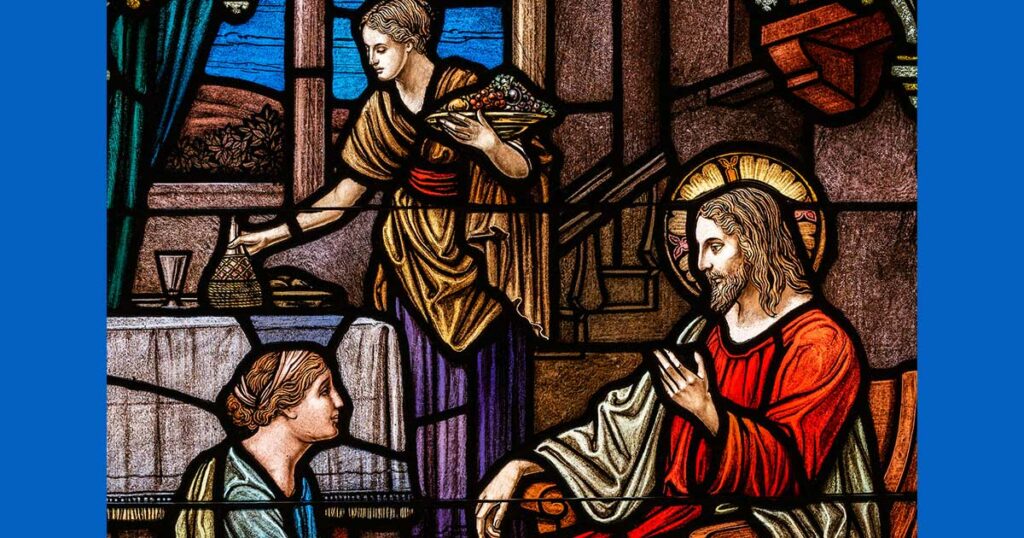To promote healthy communication in times of confrontation and conflict, experts in the field encourage the use of “I” statements. This must be spelled out for us (that’s “I” with an “I”) because we humans are not very good at it without coaching and correction. “I” statements don’t come loaded with critical snaps. They set the tone for reasonable, calm interactions without accusing the other party.
In our Christian lives of faith, we learn from a young age that humble confession is simple and direct. It goes, “I, a poor miserable sinner . . .” Simple, perhaps, but not easy. Maybe we get there verbally, but mentally and emotionally we’ve often spent some time in Blameville first, stewing about whatever “you” did wrong.
Old as Time
The problem is as old as time (or thereabouts). The first people to float the accusatory tone in times of trouble were none other than the first people.
After the fall into sin, God pursued His crouched creatures and coaxed them out of their hiding place with a series of clarifying questions. He knew every answer, of course, but He wanted to hear from them what went down and give them an opportunity to confess.
Adam was questioned first since he was the responsible party. Adam’s crack at an “I” statement eventually tumbled out, but not without some front-loaded excuse making and blame casting.
God to the man: “Who told you that you were naked? Have you eaten of the tree of which I commanded you not to eat?” (Gen. 3:11).
Adam: “The woman whom you gave to be with me, she gave me fruit of the tree, and I ate” (Gen. 3:12).
Notice that Adam doesn’t go directly to blaming Eve. First, he blames God, which is gutsy. Then he does go ahead and blame Eve, too. And finally, kind of tacked on as an afterthought, we hear the brief confession, which was all that was needed in the first place: “I ate.” Ahem.
Next, God questioned Eve.
God to the woman: “What is this that you have done?” (Gen. 3:13)
Eve: “The serpent deceived me, and I ate” (Gen. 3:13).
To her credit, Eve does not sass God à la “the serpent whom you made,” but she doesn’t lead with an “I” statement either. Though she doesn’t blame God in the same way that Adam did, she fails to go directly to the succinct, two-word confession, “I ate,” which would have sufficed and been more honorable without the finger point.
Blaming God
The dodgy move is an old one and a present-day one. It still troubles the communications and conflict resolution experts who know there’s a better way. Even those of us who have been duly informed and equipped — even those of us who are Christians — lose our cool and our poise. We reach for the same pointy pointer, hardened heart and accusing attitude that our first mother and father cultivated in the garden.
While our Lord invites us to cast our burdens upon Him (Psalm 55:22), it is very hard for us to do so without also casting a bit of blame while we’re at it.
The terrified disciples in a storm-tossed boat took their care to Christ by way of an accusing (and, truly, thoughtless) question: “Do you not care that we are perishing?” (Mark 4:38). When Martha of the famous Mary/Martha duo grumped about her unhelpful sister, she implicated Jesus in remarkably similar terms, “do you not care that my sister has left me to serve alone?” (Luke 10:40).
God Cares
The answer, of course, is yes. Yes, He cares — deeply, even. Peter tells us that we can cast all our anxieties on Him because He cares for us (1 Peter 5:7). If God did not care for us, there could be no good news at all.
Yet there is. The Good News for all of us, from the ones sitting behind the bushes in paradise lost, to the soggy boat crew, to the sour sibling, is that the Lord does not cut us off for failing to deliver the precision of a perfectly primped “I” statement. Even when confrontations, conflicts and confessions majorly miss the mark, He doesn’t abandon us to the deadly fruits of a doomed tree or the plight of a thrashed boat or the bitter pile of household chores that makes us resent the perceived slackers among us.
Ultimately, God took the blame that His first people threw at Him, and though it was not rightly His, He bore it. He took it all the way to the death on the cross. That is how far He takes the blame that He does not deserve. He invites us to continue casting our cares upon Him, trusting that He is strong enough to hold all our sorrows in His hands, merciful and gracious enough to forgive our sins, and patient enough to set us again and again on the path that leads to life everlasting.
Photo: LCMS Communications/Erik M. Lunsford




